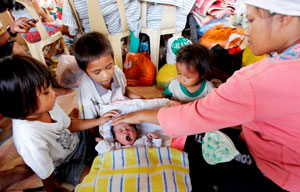MANILA – UNFPA, the United Nations Population Fund, is working with international and local partners to provide essential reproductive health supplies to respond to the needs of over 12,000 pregnant and lactating women in various evacuation centres in areas affected by tropical storm Washi in Cagayan de Oro and Iligan cities in the Philippines.
As part of the United Nations humanitarian appeal, UNFPA is seeking approximately $1.4 million to help the affected populations. According to estimates by the Philippines Government, over 92,000 families, or 640,000 people, are currently affected by the disaster.
UNFPA has also mobilized youth volunteers to organize young people in evacuation centres to help raise awareness about available medical services and to monitor incidents of gender-based violence. These youth are also collecting vital data about pregnant, post-partum and lactating women, as well as other vital statistics such as the number of young people in these centres. Through collaboration with the government, UNFPA is working with local organizations to conduct psychosocial counselling and set up emergency referral systems for survivors of gender-based violence.
At least 22 village health centres have been damaged or totally washed away by the floods. Pregnant women who are in labour are referred to regional hospitals that are already swamped with regular patients.
UNFPA will distribute clean delivery kits to an estimated 8,500 pregnant women to ensure safe deliveries. Each kit includes soap, a clean razor blade and string to cut and tie the umbilical cord, a plastic sheet and a blanket to protect the baby from hypothermia.
Reproductive health care supplies and medicine are also being distributed to health and regional hospitals. UNFPA is supporting the deployment of additional medical teams, composed of doctors, midwives and other health workers.
Nearly 35,000 dignity kits, also known as hygiene kits, will also be distributed to affected women and girls, including 4,200 mothers who are breastfeeding, in and around the evacuation centres. These kits include basic sanitary supplies, such as soap, changing garment, towels, sanitary pads and toilet paper.
For more information, please contact:
In Manila: Arlene Alano, tel. + 63 2 901 0306, mobile +63 917 515 3559, alano@unfpa.org
In New York: Omar Gharzeddine, tel: + 1 212 297 5028, gharzeddine@unfpa.org
Taking Care of Mothers’ Hygiene Needs in Evacuation Centres

CAGAYAN DE ORO, Philippines – It was around 10pm last December 16 when nine months pregnant Eagil Bautista was roused from sleep by loud voices in her neighbourhood in Barangay Acacia, one of the villages affected in the recent flooding.
To her surprise, her feet immersed in water when she got up from bed to find out what was going on. When she opened the door, flood water came surging in and, all of a sudden, the water inside their house was already waist-deep. Her husband was away at that moment but luckily, his sister and parents were around to help her out of the house.
“We sought refuge at the house of a neighbour but the floodwater eventually seeped in as well,” the 32-year-old Eagil narrated.
In the same neighbourhood lived Lindy Ocoras, 18, who is five months pregnant with her first child. She had to first ensure that her three younger siblings were on safer grounds before she and her husband escaped the fast-rising floodwater.
“I had difficulty running because of my condition, it was good my husband was around. A neighbor allowed us to seek temporary shelter in their big house,” Lindy said.
Eagil and Lindy were among the pregnant and lactating mothers temporarily sheltered at the West City Central School in Cagayan de Oro who attended a mothers’ information session organized by UNFPA, Department of Social Welfare and Development and the Department of Health at the evacuation centre on December 29. The session taught the women the importance of maintaining hygiene while in the evacuation centre to protect them and their babies from disease and infection, thus preventing maternal and infant deaths.
Just like most of the evacuees, Eagil and Lindy were not able to save any belongings when they fled their houses. It was therefore a great relief when they received hygiene kits, also known as “dignity kits,” donated by the Australian Aid for International Development (AusAID) and the Spanish government humanitarian agency AECID through the UNFPA, after the information session.
The kits contain basic sanitary supplies such as soap, changing garment, underwear, towels, toilet paper and sanitary pads to ensure that women and girls maintain hygiene and sanitation even while at the evacuation centre.
Women in their last trimester of pregnancy were also given clean delivery kits which could be used in case of an emergency childbirth outside a health centre or hospital.
Interviewed before the mothers’ information session, Eagil was only wishing she could have more underwear to maintain hygiene. She was, therefore, thankful to receive more than what she expected.
UNFPA is distributing thousands more of the dignity kits to all women and girls still living in evacuation centres in the coming days as supplies have started arriving. Clean delivery kits will also be provided to pregnant women nearing their due date.
– Arlene Alano


